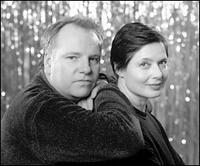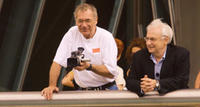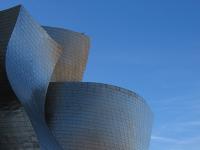 Sometimes films have to be gestated like a good meal before they can be written about - and that explains the slight delay since my last posts. Though late, as you scroll below you will certainly see I am not at a loss for words!
Sometimes films have to be gestated like a good meal before they can be written about - and that explains the slight delay since my last posts. Though late, as you scroll below you will certainly see I am not at a loss for words! Besides I have a good excuse for my absence. I have been in image heaven. On Monday I had two of most beautiful encounters in this festival: one was a building, the other was an actor/writer... gifted daughter-of-giants. Yes, another one. (See the Liza!!! link if you don’t know who the first one is.)
My Dad is 100 Years Old, is a loving, playful, ingenious collaboration of Canadian experimental filmmaker and badboy Guy Maddin and his recent muse, Isabella Rossellini, with whom he worked in his previous feature The Saddest Music in the World. The film is Rossellini’s tribute to her father’s centenary, coming in 2006,and Roberto Rossellini’s Rome: Open City was screened alongside it.

The rough condition of the Open City print projected on Monday was a testament all by itself to the great need for restoration and loving attention to the work of Roberto Rossellini, a man who not only helped to launch the Italian neo-realist movement, but whose work had a profound impact on the French new wave. In her beautiful love letter to her father, Isabella Rossellini wrote the script and plays all the characters - and does so with amazing conviction: Hitchcock, David O. Selznick, Fellini, Chaplin are all created in humour and great love. But nothing quite prepares you for how she floats on screen as her own mother, saying “He did not ruin my career - I ruined his” with just the right note of sadness.
How strange to see the the Maddin/Rossellini film, with its deliberate look of rough black and white scratchy texture approximating a badly kept old 40s print, alongside the copy of Open City that truly has earned its patchy projection quality through “being loved”, as the programmer put it, by screening houses for fifty years. And yet there is a hypnotic beauty to watching a film in such bad condition - it feels more like the rare treasure that it is. And if you happen to be seated in a place where you can look over your right shoulder and see the filmmaker’s daughter watching with a beguiled wistfulness, the images flickering against her skin, you will want to empty your bank account into film preservation and draw up petitions to get this master restored to his rightful place.
 While Rome Open City has a 12 hanky ending, there is nothing sad about Isabella. In the post-screening dialogue, she sat perched on a stool and told story after story with playfulness, humour and charm, and great loving celebration of her father. The syllables tumbling out of her mouth in that gorgeous Italian accent like lost Medici jewels. Okay, I know, I’m a little out of control, but come on. When will I get the chance again to tell you that having asked the first question, and because of where I was sitting and the way she was drenched in light and couldn’t see, a great deal of what she said for the remaining time was directed at me, simply for the eye contact, for feeling like she was talking to someone. Let me tell you right now that being in that gaze for 45 minutes is a wondrous thing. As if the personality weren’t compelling enough, there is something especially enchanting about that voice and its desire constantly to bubble and amuse. (Even Guy Maddin thanked his girlfriend for letting him “sleep over at Isabella’s” during story sessions and at another moment, confessed, “I haven’t quite gotten over the thrill of having I. Rossellini appear on my call display.”) A story Ms. Rossellini told about meeting Anna Magnani (whom the Rossellinis called “the wolf”) was especially memorable: as a child looking down in shyness, she saw only the great goddess’ pink frilly shoes and the dozen dogs running round them. It’s worth noting that on Monday she herself was wearing exquisite brown crepe pull on boots. Enough!
While Rome Open City has a 12 hanky ending, there is nothing sad about Isabella. In the post-screening dialogue, she sat perched on a stool and told story after story with playfulness, humour and charm, and great loving celebration of her father. The syllables tumbling out of her mouth in that gorgeous Italian accent like lost Medici jewels. Okay, I know, I’m a little out of control, but come on. When will I get the chance again to tell you that having asked the first question, and because of where I was sitting and the way she was drenched in light and couldn’t see, a great deal of what she said for the remaining time was directed at me, simply for the eye contact, for feeling like she was talking to someone. Let me tell you right now that being in that gaze for 45 minutes is a wondrous thing. As if the personality weren’t compelling enough, there is something especially enchanting about that voice and its desire constantly to bubble and amuse. (Even Guy Maddin thanked his girlfriend for letting him “sleep over at Isabella’s” during story sessions and at another moment, confessed, “I haven’t quite gotten over the thrill of having I. Rossellini appear on my call display.”) A story Ms. Rossellini told about meeting Anna Magnani (whom the Rossellinis called “the wolf”) was especially memorable: as a child looking down in shyness, she saw only the great goddess’ pink frilly shoes and the dozen dogs running round them. It’s worth noting that on Monday she herself was wearing exquisite brown crepe pull on boots. Enough! Sydney Pollack, the American director, is noted primarily these days as a producer more than a filmmaker. A man whose early directing days include They Shoot Horses Don’t They and Out of Africa, his more recent films like Sabrina and Sliding Doors, feel somehow incomplete, almost-great works. Luckily, there are nothing but compelling moments in his current documentary, Sketches of Frank Gehry, a tribute to an old friend and possibly the world’s greatest living architect.
Sydney Pollack, the American director, is noted primarily these days as a producer more than a filmmaker. A man whose early directing days include They Shoot Horses Don’t They and Out of Africa, his more recent films like Sabrina and Sliding Doors, feel somehow incomplete, almost-great works. Luckily, there are nothing but compelling moments in his current documentary, Sketches of Frank Gehry, a tribute to an old friend and possibly the world’s greatest living architect. What Canadian does not know the name Frank Gehry? If you’ve been anywhere near the Art Gallery of Ontario in recent months, you wouldn’t be able to avoid it, as the maestro has designed the revisioning of that Toronto arthouse that is well underway. I have always known generally who he is, and that he is home grown, but it wasn’t until viewing this wonderful, irreverent and awe-inspiring documentary that I came face to face with his work. Pollack’s long intimate friendship with Gehry allows an unusually candid almost confessional tone – even Gehry’s shrink offers secrets to his psyche! And there are wonderful insights into how inspiration occurs, such as when Pollack describes how he is influenced by music into finding images as a filmmaker. Gehry responds that the same thing happens to him with art. Quickly pulling out a print of Heronimus Bosch, he traces the outlines of figures and translates them into architectural shapes.
The pacing of the film is like a single crescending line of a music: we are lulled into seduction by the whimsical playfulness of personal residence creations, then move to larger structures and buildings until, like Dante entering paradise (I know I’m overusing it), suddenly there we are in
Bilbao, Spain. For the second time in this festival, I burst into sudden tears.
 Pollack’s gift is that he knows when to keep silent and allow us to just observe beauty. The reflection of water on the gold metal of the Guggenheim Museum in daylight, the upwardly swirling textures like the clouds they meet, are given to us in silence. Those who appreciate the true meaning of cathedral, in terms of a space which exalts the great glory of what man is capable of, will experience this museum in the same way I’m sure. In the two days since, I have not been able to get its glorious shapes out of my mind.
Pollack’s gift is that he knows when to keep silent and allow us to just observe beauty. The reflection of water on the gold metal of the Guggenheim Museum in daylight, the upwardly swirling textures like the clouds they meet, are given to us in silence. Those who appreciate the true meaning of cathedral, in terms of a space which exalts the great glory of what man is capable of, will experience this museum in the same way I’m sure. In the two days since, I have not been able to get its glorious shapes out of my mind.
No comments:
Post a Comment